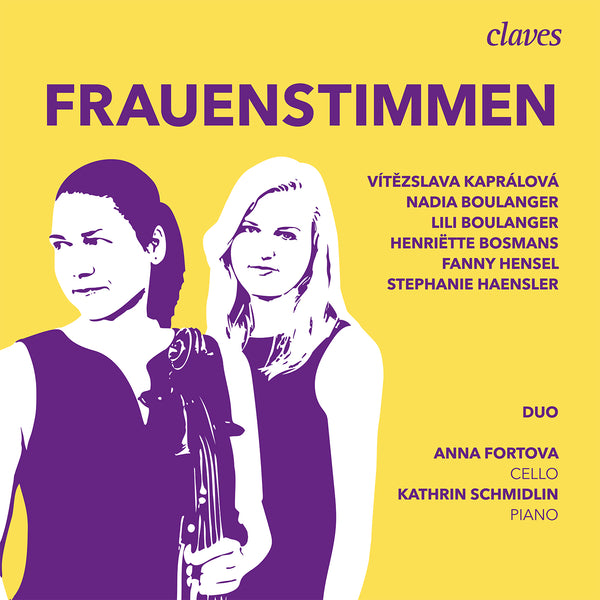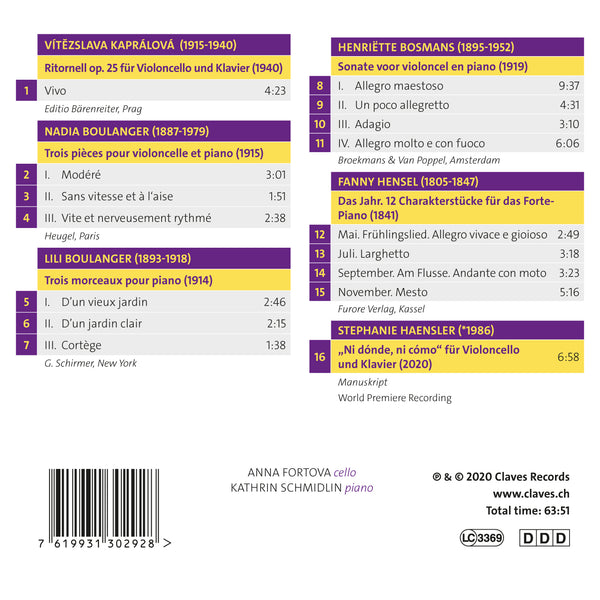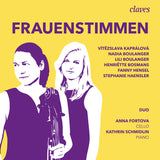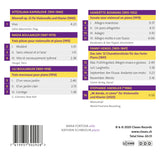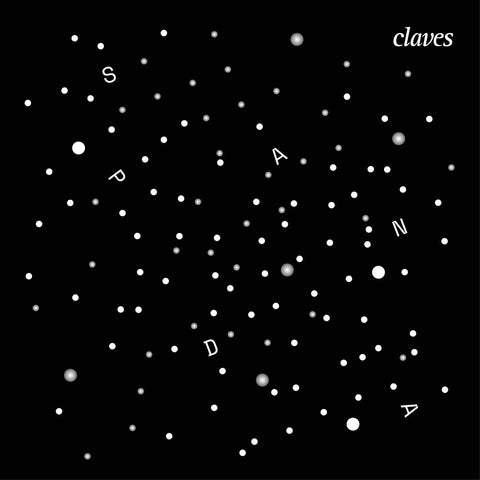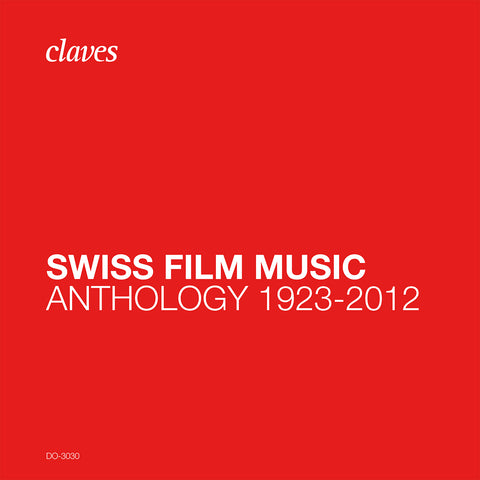(2021) Frauenstimmen - Duo Anna Fortova, Kathrin Schmidlin
Category(ies): Chamber Piano Rarities
Instrument(s): Cello Piano
Main Composer: Nadia Boulanger
CD set: 1
Catalog N°:
CD 3029
Release: 07.02.2021
EAN/UPC: 7619931302928
This album is now on repressing. Pre-order it at a special price now.
CHF 18.50
This album is no longer available on CD.
This album has not been released yet. Pre-order it from now.
CHF 18.50
This album is no longer available on CD.
CHF 18.50
VAT included for Switzerland & UE
Free shipping
This album is no longer available on CD.
VAT included for Switzerland & UE
Free shipping
This album is now on repressing. Pre-order it at a special price now.
CHF 18.50
This album is no longer available on CD.
This album has not been released yet.
Pre-order it at a special price now.
CHF 18.50
This album is no longer available on CD.
CHF 18.50
This album is no longer available on CD.
FRAUENSTIMMEN - DUO ANNA FORTOVA, KATHRIN SCHMIDLIN
"Fifty years ago, on February 7, 1971, Switzerland finally gave women the right to vote at the federal level. This 100% feminine record wishes to commemorate this event, by remembering also that Claves was created in Switzerland (in 1968...), by a woman: Marguerite Dütschler !"
WOMEN’S VOICES
Compositions from both East and West here bring together the powerful voices of six women composers from contrasting cultures. Their music ranges from the Romantic period via Impressionism and Neoclassicism to the present. Vivid impressions alternate with absolute music, strict sonata forms with free forms full of delicate musical poetry.
The standard repertoire of the 19th and 20th centuries, dominated by the male “Bs” Beethoven, Brahms, Bruckner, Bartók and others like them, is increasingly being freshened up by works either long forgotten or suppressed that were composed by women who just happen to have the same initial for their surnames, such as Grażyna Bacewicz, Agathe Backer-Grøndahl, Elsa Barraine, Amy Marcy Beach, Sylvie Bodorová, Mel Bonis, Henriëtte Bosmans, Lili and Nadia Boulanger and Joanna Bruzdowicz.
Lili Boulanger and Vítězslava Kaprálová are united by a tragic fate, for both died at the age of just 24.
Vítězslava Kaprálová (1915-1940) was the daughter of Janáček’s master student Václav Kaprál. She was born in Brno, and was early on recognised as a musical Wunderkind. She took her first piano lessons at the age of five, and began to compose at nine. She trained at the Prague Conservatory, studying composition under Vítězslav Novák, a former student of Dvořák’s, and conducting with Václav Talich. From 1937 onwards she lived in Paris, where she competed her composition studies with Bohuslav Martinů. She enjoyed a resounding success in 1938 when she conducted the world première of her own Military Sinfonietta at the 16th Festival of the International Society for Contemporary Music in London. Her musical motto was: “I want to show the men how it’s done!”. She was only able to complete one of two Ritornelli that she had planned in the year of her death. As can be heard here, it oozes energy.
Nadia Juliette Boulanger (1887-1979) was born and died in Paris. Although she ceased composing at 25, she made her name as a composition teacher. Of her Trois Morceaux (“Three pieces”), the first two began as early organ pieces, while the third is an original work enriched with Spanish elements.
The Parisian composer Marie-Juliette Olga Lili Boulanger (1893-1918) achieved overnight fame when she became the first woman to win the legendary Grand Prix de Rome, with her cantata Faust et Hélène. She was often sick as a child, and she died on 15 March 1918, just ten days before her role model Claude Debussy. It was in Rome in 1914 that she composed the expressive, atmospheric scenes conjured up in her D’un vieux jardin (“Of an old garden”), D’un jardin clair (“Of a bright garden”) and Cortège. The first piece is notable for its bold harmonic shifts, while the other two reveal the influence of Debussy.
Henriëtte Hilda Bosmans (1895-1952) was born in Amsterdam, where she studied at the Conservatory and also privately with the composer Willem Pijper. She composed numerous songs to French texts, several solo works with orchestra, a string quartet and the Sonata in A minor for cello and piano (1919). Mighty chords open the majestic first movement and also close the fourth – thereby closing the circle.
Felix Mendelssohn Bartholdy’s sister Fanny Caecilia Hensel-Mendelssohn (1805-1847) was born in Hamburg, and in 1829 married the painter Wilhelm Hensel. She died in Leipzig. Her cycle Das Jahr (“The year”) of 1841 comprises 12 character pieces, and was composed as a reminiscence of a trip to Italy. The springlike “May” seems to bear within it the spirit of a song without words. The middle section of “July” has a dramatic climax, with ominous tremolandi in the bass; this offers the greatest possible contrast to the melancholic sentiments express in “September. By the river”. In “November”, we hear an autumn storm, “appassionato”.
Stephanie Haensler was born in Baden in 1986 and studied with Robert Zimansky (violin) and Isabel Mundry (composition) at the Zurich University of the Arts. Her composition “ni dónde, ni cómo” (“neither where nor how”) is based on the text of a Chilean women’s artists’ collective, protesting about violence against women. She composed it to a commission from Kathrin Schmidlin and Anna Fortova to commemorate the fiftieth anniversary of women’s suffrage in Switzerland in 2021. She here explores the question as to where freedom begins, and what it means to have a voice and the right to express yourself and to have a say in things.
The many sophisticated expression markings and performance instructions here use the subtlest emotional nuances to provide a voice to oppressed, maltreated women. This work’s profound exploration of sound and noise displays the brilliant mastery of this socially committed composer.
Walter Labhart
Translated from German by Chris Walton
REVIEWS
« [..] Imaginé pour célébrer le 50e anniversaire du suffrage féminin en Suisse par la violoncelliste Anna Fortova et la pianiste Kathrin Schmidlin, l’album «Frauenstimmen » (Voix de femmes) dresse le portrait de ces compositrices qui ont comme point commun d’avoir impressionné leurs contemporains par un talent musical hors du commun, sans pour autant entrer durablement au répertoire. La maigre place donnée à la femme n’est pas seule en cause. Si la maladie ne les avait pas fauchées à 24 ans, Lili Boulanger et Vitezslava Kapralova auraient certainement fait parler d’elles loin à la ronde. La compositrice tchèque n’a-t-elle pas affirmé «Je veux en montrer aux hommes»? La diatribe féministe de Stephanie Haensler (née en 1986) qui clôt le disque montre aussi de quel bois les compositrices d’aujourd’hui se chauffent! » - Matthieu Chenal, juin 2021
« Frauenstimmen lautet der mächtige Titel einer CD, auf der die Cellistin Anna Fortova und die Pianistin Kathrin Schmidlin tolle Werke von sechs Komponistinnen spielen: von der Romantik bis in die Gegenwart, von Paris bis Prag. Darunter zu finden «Ni donde, ni como» der Badener Komponistin Stephanie Haensler, das auf einen gegen Gewalt an Frauen protestierenden Text chilenischer Künstlerinnen baut. » - Christian Berzins, März 2021
« [..] Kathrin Schmidlin gab diese pianistischen Kostbarkeiten in der Villa Boveri mit unendlich fein abgestuftem Anschlag wieder. Den zarten Lyrismen der Pariser Komponistin, die wie ihre tschechische Kollegin Kapralová mit nur 24 Jahren gestorben war, wurde sie mit ungemein differenziertem Feingefühl im selben Masse gerecht wie den poetischen Qualitäten von vier Stücken aus dem Zyklus «Das Jahr» von Fanny Hensel- Mendelssohn. Von diesen genialen Charakterstücken fesselte durchgehend der hoch virtuos wiedergegebene «November » mit seinen aufwühlenden Herbststürmen. [..] » - Walter Labhart, Oktober 2020
« Vor fünf Jahren wurden Cellistin Anna Fortova und Pianistin Kathrin Schmidlin zum Duo. Hier spielen sie Werke von Komponistinnen aus drei Jahrhunderten. Fanny Hensel, Nadia und Lili Boulanger sind bis heute bekannt. Vitezslava Kapralova und Henriëtte Bosmans gilt es zu entdecken. Dieses vielfältige Programm gipfelt in einer Komposition der Aargauerin Stephanie Haensler, die sie zum 50. Jahrestag des Frauenstimmrechts schrieb. » - Frank von Niederhäusern, März 2021
« [..] Ici, la problématique politique de la liberté d'expression, du libre choix et de la contrainte rejoint les préoccupations de tout créateur. La Tchèque Anna Fortova et la Suisse Kathrin Schmidlin sont à la hauteur des enjeux par la qualité du son, l'homogénéité de leur équipe et la puissance expressive qui émane de leur engagement musical. » - Jacques Bonnaure, mai 2021
« [..] Einstieg und Abschluss des Albums sind besonders kraftvoll: Das Ritornell der tschechischen Komponistin Vitĕzslava Kapralova von 1940 springt virtuos von lyrischen Linien zu schnellen Laufen und Doppelgriffen. Die Weltersteinspielung des Stucks „ni donde, ni como“ der Komponistin Stephanie Haensler ist eine Auftragskomposition fur das Duo und erprobt auf knapp sieben Minuten die unterschiedlichsten Klang - und Gerauschfacetten des Cellos und des Klaviers. Die Stimmen unterdruckter Frauen sollen so horbar werden. Damit schlagt das in der Schweiz ansassige Duo den Bogen zum Titel des Albums: „Frauenstimmen“ bezieht sich zum einen auf das 50-jahrige Jubilaum des Frauenstimmrechts in der Schweiz und zum anderen darauf, dass die Stimmen der Frauen, der Komponistinnen in der Musik immer noch zu wenig horbar sind. Dass die Produktion mittels Crowdfunding finanziert werden musste, sagt dabei schon das meiste aus uber den Stand der Gleichberechtigung. » - Dorothee Riemer, Juli 2021
« [..] Die beiden Musikerinnen klingen und agieren sehr synchron. Die Tonqualität ist klar, rhythmisch agieren beide sehr präzise und eingespielt. Insgesamt ist dies eine souveräne Präsentation der Werke der Komponistinnen. Die CD biete einen schönen Einstieg in die Thematik der weiblichen Repräsentation und regt zum Nachdenken und Nachforschen an. Das Booklet in Deutsch und Englisch enthält neben den Biografien der Interpretinnen einen kurzen Überblick über die Komponistinnen und die hier eingespielten Werke. » - Anneke Link, April 2021
« Dans le domaine de la musique dite «savante», les compositrices sont nettement moins représentées et reconnues. Mais le 50e anniversaire du droit de vote des femmes permet à la violoncelliste Anna Fortova et à la pianiste Kathrin Schmidlin de rappeler qu’elles se sont battues pour se faire entendre. Les oeuvres en duo ou pour piano seul de ce disque mettent en valeur des Voix de femmes du XIXe au XXIe siècles, romantiques, impressionnistes, contemporaines. Qui n’ont rien à envier en force ni en inventivité. [..] » . Elisabeth Hass, février 2021
« Sur le CD Frauenstimmen, les musiciennes suisses Kathrin Schmidlin et Anna Fortova mettent en lumière des œuvres demeurées dans l’ombre de leurs pairs masculins. Le 7 février dernier, la Suisse célébrait le cinquantenaire du droit de vote et d’éligibilité de ses citoyennes. Cette date, la violoncelliste Anna Fortova et la pianiste Kathrin Schmidlin l’avaient choisie pour publier chez Claves un précieux CD, entièrement au féminin. Frauenstimmen (voix de femmes) met en avant les répertoires de six compositrices classiques de provenances et de périodes différentes. [..] » - Gianluigi Bocelli, mai 2021
“[..] That's why we're all the more appreciative of the Swiss label Claves, which, with this new album, is highlighting one nineteenth-century and five twentieth-century female composers. The years are, in order of appearance: the Czech Vítezslava Kaprálová (1915-1940), the French Nadia (1887-1979) and Lili Boulanger (1893-1918), the Dutch Henriëtte Bosmans (1895-1952), the German Fanny Hensel (1805-1847) and the Swiss Stephanie Haensler (1986). What they all have in common is that they were excellent composers and, in Haensler's case, that she knew how to compose. To which I reply once again that anyone unfamiliar with this music could not suspect a woman behind it, could not label it as ‘feminine’ music. The same applies to the interpretation of these pieces: the cellist Anna Fortova, who lives and works in Switzerland, and the pianist Kathrin Schmidlin could just as easily have been men in their interpretations (in fact, I've never heard anyone say otherwise...). It might be a good idea to know that ‘Ni dónde, ni cómo’ was performed by the two ladies from the manuscript, so it hasn't yet been released by the press, and has therefore acquired the status of a world premiere.” - Aart van der Wal, February 2021
« Le duo Anna Fortova et Kathrin Schmidlin s'approprient à bras-le-corps des partitions 100 % féminines en passant du romantisme à nos jours. [..] » - Cecilia Viola, mars 2021
« [..] Die in Prag geborene Cellistin Anna Fortova (*1982) und die Schweizer Pianistin Kathrin Schmidlin (*1990) setzen den Schwerpunkt auf die erste Hälfte des 20. Jahrhunderts. [..»In den Trois morceaux pour piano (1914) von Lili Boulanger (1893–1918) beweist Kathrin Schmidlin beachtliches Können. Vor allem die Transparenz und Präzision im «Cortège» sind beeindruckend. [..] Den Schlusspunkt setzt die Komposition ni dónde, ni cómo von Stephanie Haensler (*1986), die Schmidlin und Fortova bei ihr in Auftrag gegeben haben. » - Niklaus Rüegg, März 2021
“Move over Beethoven, Bach and Brahms! It’s Bosmans, Boulanger and Boulanger in this fascinating Claves release of all-women composers, ranging across Romantic, Impressionist, Neo Classical and Modern genres, free forms as well as strict sonata form. Talent and vagaries of fate link these creative minds who just happen to be female. How refreshing to still discover ‘new’ compositions written, in some cases, almost 200 years ago! [..] Duo Anna Fortova, cello, and Kathrin Schmidlin, piano perform admirably.” - Robert Ekselman, October 2021
« Ce n’est pas parce que le style de ces compositrices s’apparente à celui de compositeurs célèbres que ce sont pour autant des épigones édulcorés. Les pièces du recueil «Das Jahr» de Fanny Hensel font immédiatement penser aux «Romances sans paroles» de son frère Felix Mendelssohn, avec le même don mélodique. Claude Debussy aurait pu inscrire à son catalogue les «Trois morceaux pour piano» de Lili Boulanger, dont la mort prématurée a brisé l’inspiration de sa sœur Nadia. Enfant prodige, Vítězslava Kaprálová, muse et amante de Bohuslav Martinů, avait autant de facilités que son maître. Quant à la «Sonate pour violoncelle et piano» d’Henriëtte Bosmans, cœur magistral de ce disque, elle se hisse à la hauteur des chefs-d’œuvre de Brahms ou de Rachmaninov. [..] » - Viktor Friesen, mars 2021
«Frauenstimmen» lautet der mächtige Titel einer CD, auf der die Cellistin Anna Fortova und die Pianistin Kathrin Schmidlin tolle Werke von sechs Komponistinnen spielen: von der Romantik bis in die Gegenwart, von Paris bis Prag. [..] » - Julia Stephan, März 2021
"Fifty years ago, on February 7, 1971, Switzerland finally gave women the right to vote at the federal level. This 100% feminine record wishes to commemorate this event, by remembering also that Claves was created in Switzerland (in 1968...), by a woman: Marguerite Dütschler !"
WOMEN’S VOICES
Compositions from both East and West here bring together the powerful voices of six women composers from contrasting cultures. Their music ranges from the Romantic period via Impressionism and Neoclassicism to the present. Vivid impressions alternate with absolute music, strict sonata forms with free forms full of delicate musical poetry.
The standard repertoire of the 19th and 20th centuries, dominated by the male “Bs” Beethoven, Brahms, Bruckner, Bartók and others like them, is increasingly being freshened up by works either long forgotten or suppressed that were composed by women who just happen to have the same initial for their surnames, such as Grażyna Bacewicz, Agathe Backer-Grøndahl, Elsa Barraine, Amy Marcy Beach, Sylvie Bodorová, Mel Bonis, Henriëtte Bosmans, Lili and Nadia Boulanger and Joanna Bruzdowicz.
Lili Boulanger and Vítězslava Kaprálová are united by a tragic fate, for both died at the age of just 24.
Vítězslava Kaprálová (1915-1940) was the daughter of Janáček’s master student Václav Kaprál. She was born in Brno, and was early on recognised as a musical Wunderkind. She took her first piano lessons at the age of five, and began to compose at nine. She trained at the Prague Conservatory, studying composition under Vítězslav Novák, a former student of Dvořák’s, and conducting with Václav Talich. From 1937 onwards she lived in Paris, where she competed her composition studies with Bohuslav Martinů. She enjoyed a resounding success in 1938 when she conducted the world première of her own Military Sinfonietta at the 16th Festival of the International Society for Contemporary Music in London. Her musical motto was: “I want to show the men how it’s done!”. She was only able to complete one of two Ritornelli that she had planned in the year of her death. As can be heard here, it oozes energy.
Nadia Juliette Boulanger (1887-1979) was born and died in Paris. Although she ceased composing at 25, she made her name as a composition teacher. Of her Trois Morceaux (“Three pieces”), the first two began as early organ pieces, while the third is an original work enriched with Spanish elements.
The Parisian composer Marie-Juliette Olga Lili Boulanger (1893-1918) achieved overnight fame when she became the first woman to win the legendary Grand Prix de Rome, with her cantata Faust et Hélène. She was often sick as a child, and she died on 15 March 1918, just ten days before her role model Claude Debussy. It was in Rome in 1914 that she composed the expressive, atmospheric scenes conjured up in her D’un vieux jardin (“Of an old garden”), D’un jardin clair (“Of a bright garden”) and Cortège. The first piece is notable for its bold harmonic shifts, while the other two reveal the influence of Debussy.
Henriëtte Hilda Bosmans (1895-1952) was born in Amsterdam, where she studied at the Conservatory and also privately with the composer Willem Pijper. She composed numerous songs to French texts, several solo works with orchestra, a string quartet and the Sonata in A minor for cello and piano (1919). Mighty chords open the majestic first movement and also close the fourth – thereby closing the circle.
Felix Mendelssohn Bartholdy’s sister Fanny Caecilia Hensel-Mendelssohn (1805-1847) was born in Hamburg, and in 1829 married the painter Wilhelm Hensel. She died in Leipzig. Her cycle Das Jahr (“The year”) of 1841 comprises 12 character pieces, and was composed as a reminiscence of a trip to Italy. The springlike “May” seems to bear within it the spirit of a song without words. The middle section of “July” has a dramatic climax, with ominous tremolandi in the bass; this offers the greatest possible contrast to the melancholic sentiments express in “September. By the river”. In “November”, we hear an autumn storm, “appassionato”.
Stephanie Haensler was born in Baden in 1986 and studied with Robert Zimansky (violin) and Isabel Mundry (composition) at the Zurich University of the Arts. Her composition “ni dónde, ni cómo” (“neither where nor how”) is based on the text of a Chilean women’s artists’ collective, protesting about violence against women. She composed it to a commission from Kathrin Schmidlin and Anna Fortova to commemorate the fiftieth anniversary of women’s suffrage in Switzerland in 2021. She here explores the question as to where freedom begins, and what it means to have a voice and the right to express yourself and to have a say in things.
The many sophisticated expression markings and performance instructions here use the subtlest emotional nuances to provide a voice to oppressed, maltreated women. This work’s profound exploration of sound and noise displays the brilliant mastery of this socially committed composer.
Walter Labhart
Translated from German by Chris Walton
REVIEWS
« [..] Imaginé pour célébrer le 50e anniversaire du suffrage féminin en Suisse par la violoncelliste Anna Fortova et la pianiste Kathrin Schmidlin, l’album «Frauenstimmen » (Voix de femmes) dresse le portrait de ces compositrices qui ont comme point commun d’avoir impressionné leurs contemporains par un talent musical hors du commun, sans pour autant entrer durablement au répertoire. La maigre place donnée à la femme n’est pas seule en cause. Si la maladie ne les avait pas fauchées à 24 ans, Lili Boulanger et Vitezslava Kapralova auraient certainement fait parler d’elles loin à la ronde. La compositrice tchèque n’a-t-elle pas affirmé «Je veux en montrer aux hommes»? La diatribe féministe de Stephanie Haensler (née en 1986) qui clôt le disque montre aussi de quel bois les compositrices d’aujourd’hui se chauffent! » - Matthieu Chenal, juin 2021
« Frauenstimmen lautet der mächtige Titel einer CD, auf der die Cellistin Anna Fortova und die Pianistin Kathrin Schmidlin tolle Werke von sechs Komponistinnen spielen: von der Romantik bis in die Gegenwart, von Paris bis Prag. Darunter zu finden «Ni donde, ni como» der Badener Komponistin Stephanie Haensler, das auf einen gegen Gewalt an Frauen protestierenden Text chilenischer Künstlerinnen baut. » - Christian Berzins, März 2021
« [..] Kathrin Schmidlin gab diese pianistischen Kostbarkeiten in der Villa Boveri mit unendlich fein abgestuftem Anschlag wieder. Den zarten Lyrismen der Pariser Komponistin, die wie ihre tschechische Kollegin Kapralová mit nur 24 Jahren gestorben war, wurde sie mit ungemein differenziertem Feingefühl im selben Masse gerecht wie den poetischen Qualitäten von vier Stücken aus dem Zyklus «Das Jahr» von Fanny Hensel- Mendelssohn. Von diesen genialen Charakterstücken fesselte durchgehend der hoch virtuos wiedergegebene «November » mit seinen aufwühlenden Herbststürmen. [..] » - Walter Labhart, Oktober 2020
« Vor fünf Jahren wurden Cellistin Anna Fortova und Pianistin Kathrin Schmidlin zum Duo. Hier spielen sie Werke von Komponistinnen aus drei Jahrhunderten. Fanny Hensel, Nadia und Lili Boulanger sind bis heute bekannt. Vitezslava Kapralova und Henriëtte Bosmans gilt es zu entdecken. Dieses vielfältige Programm gipfelt in einer Komposition der Aargauerin Stephanie Haensler, die sie zum 50. Jahrestag des Frauenstimmrechts schrieb. » - Frank von Niederhäusern, März 2021
« [..] Ici, la problématique politique de la liberté d'expression, du libre choix et de la contrainte rejoint les préoccupations de tout créateur. La Tchèque Anna Fortova et la Suisse Kathrin Schmidlin sont à la hauteur des enjeux par la qualité du son, l'homogénéité de leur équipe et la puissance expressive qui émane de leur engagement musical. » - Jacques Bonnaure, mai 2021
« [..] Einstieg und Abschluss des Albums sind besonders kraftvoll: Das Ritornell der tschechischen Komponistin Vitĕzslava Kapralova von 1940 springt virtuos von lyrischen Linien zu schnellen Laufen und Doppelgriffen. Die Weltersteinspielung des Stucks „ni donde, ni como“ der Komponistin Stephanie Haensler ist eine Auftragskomposition fur das Duo und erprobt auf knapp sieben Minuten die unterschiedlichsten Klang - und Gerauschfacetten des Cellos und des Klaviers. Die Stimmen unterdruckter Frauen sollen so horbar werden. Damit schlagt das in der Schweiz ansassige Duo den Bogen zum Titel des Albums: „Frauenstimmen“ bezieht sich zum einen auf das 50-jahrige Jubilaum des Frauenstimmrechts in der Schweiz und zum anderen darauf, dass die Stimmen der Frauen, der Komponistinnen in der Musik immer noch zu wenig horbar sind. Dass die Produktion mittels Crowdfunding finanziert werden musste, sagt dabei schon das meiste aus uber den Stand der Gleichberechtigung. » - Dorothee Riemer, Juli 2021
« [..] Die beiden Musikerinnen klingen und agieren sehr synchron. Die Tonqualität ist klar, rhythmisch agieren beide sehr präzise und eingespielt. Insgesamt ist dies eine souveräne Präsentation der Werke der Komponistinnen. Die CD biete einen schönen Einstieg in die Thematik der weiblichen Repräsentation und regt zum Nachdenken und Nachforschen an. Das Booklet in Deutsch und Englisch enthält neben den Biografien der Interpretinnen einen kurzen Überblick über die Komponistinnen und die hier eingespielten Werke. » - Anneke Link, April 2021
« Dans le domaine de la musique dite «savante», les compositrices sont nettement moins représentées et reconnues. Mais le 50e anniversaire du droit de vote des femmes permet à la violoncelliste Anna Fortova et à la pianiste Kathrin Schmidlin de rappeler qu’elles se sont battues pour se faire entendre. Les oeuvres en duo ou pour piano seul de ce disque mettent en valeur des Voix de femmes du XIXe au XXIe siècles, romantiques, impressionnistes, contemporaines. Qui n’ont rien à envier en force ni en inventivité. [..] » . Elisabeth Hass, février 2021
« Sur le CD Frauenstimmen, les musiciennes suisses Kathrin Schmidlin et Anna Fortova mettent en lumière des œuvres demeurées dans l’ombre de leurs pairs masculins. Le 7 février dernier, la Suisse célébrait le cinquantenaire du droit de vote et d’éligibilité de ses citoyennes. Cette date, la violoncelliste Anna Fortova et la pianiste Kathrin Schmidlin l’avaient choisie pour publier chez Claves un précieux CD, entièrement au féminin. Frauenstimmen (voix de femmes) met en avant les répertoires de six compositrices classiques de provenances et de périodes différentes. [..] » - Gianluigi Bocelli, mai 2021
“[..] That's why we're all the more appreciative of the Swiss label Claves, which, with this new album, is highlighting one nineteenth-century and five twentieth-century female composers. The years are, in order of appearance: the Czech Vítezslava Kaprálová (1915-1940), the French Nadia (1887-1979) and Lili Boulanger (1893-1918), the Dutch Henriëtte Bosmans (1895-1952), the German Fanny Hensel (1805-1847) and the Swiss Stephanie Haensler (1986). What they all have in common is that they were excellent composers and, in Haensler's case, that she knew how to compose. To which I reply once again that anyone unfamiliar with this music could not suspect a woman behind it, could not label it as ‘feminine’ music. The same applies to the interpretation of these pieces: the cellist Anna Fortova, who lives and works in Switzerland, and the pianist Kathrin Schmidlin could just as easily have been men in their interpretations (in fact, I've never heard anyone say otherwise...). It might be a good idea to know that ‘Ni dónde, ni cómo’ was performed by the two ladies from the manuscript, so it hasn't yet been released by the press, and has therefore acquired the status of a world premiere.” - Aart van der Wal, February 2021
« Le duo Anna Fortova et Kathrin Schmidlin s'approprient à bras-le-corps des partitions 100 % féminines en passant du romantisme à nos jours. [..] » - Cecilia Viola, mars 2021
« [..] Die in Prag geborene Cellistin Anna Fortova (*1982) und die Schweizer Pianistin Kathrin Schmidlin (*1990) setzen den Schwerpunkt auf die erste Hälfte des 20. Jahrhunderts. [..»In den Trois morceaux pour piano (1914) von Lili Boulanger (1893–1918) beweist Kathrin Schmidlin beachtliches Können. Vor allem die Transparenz und Präzision im «Cortège» sind beeindruckend. [..] Den Schlusspunkt setzt die Komposition ni dónde, ni cómo von Stephanie Haensler (*1986), die Schmidlin und Fortova bei ihr in Auftrag gegeben haben. » - Niklaus Rüegg, März 2021
“Move over Beethoven, Bach and Brahms! It’s Bosmans, Boulanger and Boulanger in this fascinating Claves release of all-women composers, ranging across Romantic, Impressionist, Neo Classical and Modern genres, free forms as well as strict sonata form. Talent and vagaries of fate link these creative minds who just happen to be female. How refreshing to still discover ‘new’ compositions written, in some cases, almost 200 years ago! [..] Duo Anna Fortova, cello, and Kathrin Schmidlin, piano perform admirably.” - Robert Ekselman, October 2021
« Ce n’est pas parce que le style de ces compositrices s’apparente à celui de compositeurs célèbres que ce sont pour autant des épigones édulcorés. Les pièces du recueil «Das Jahr» de Fanny Hensel font immédiatement penser aux «Romances sans paroles» de son frère Felix Mendelssohn, avec le même don mélodique. Claude Debussy aurait pu inscrire à son catalogue les «Trois morceaux pour piano» de Lili Boulanger, dont la mort prématurée a brisé l’inspiration de sa sœur Nadia. Enfant prodige, Vítězslava Kaprálová, muse et amante de Bohuslav Martinů, avait autant de facilités que son maître. Quant à la «Sonate pour violoncelle et piano» d’Henriëtte Bosmans, cœur magistral de ce disque, elle se hisse à la hauteur des chefs-d’œuvre de Brahms ou de Rachmaninov. [..] » - Viktor Friesen, mars 2021
«Frauenstimmen» lautet der mächtige Titel einer CD, auf der die Cellistin Anna Fortova und die Pianistin Kathrin Schmidlin tolle Werke von sechs Komponistinnen spielen: von der Romantik bis in die Gegenwart, von Paris bis Prag. [..] » - Julia Stephan, März 2021
Return to the album | Read the booklet | Composer(s): Nadia Boulanger Lili Boulanger Henriëtte Bosmans Fanny Hensel | Main Artist: Duo Frauenstimmen - Anna Fortova & Kathrin Schmidlin
STUDIO MASTER (HIGH-RESOLUTION AUDIO)
Anna Fortova
Cello
Chamber
Classica - 4 étoiles
Duo Frauenstimmen - Anna Fortova & Kathrin Schmidlin
Fanny Hensel
Fondation Suisa
Henriëtte Bosmans
High-resolution audio - Studio master quality
In stock
Kathrin Schmidlin - piano
Lili Boulanger
Nadia Boulanger
Piano
Rarities
Stephanie Haensler
Vítězslava Kaprálová
Anna Fortova
Cello
Chamber
Classica - 4 étoiles
Duo Frauenstimmen - Anna Fortova & Kathrin Schmidlin
Fanny Hensel
Fondation Suisa
Henriëtte Bosmans
High-resolution audio - Studio master quality
In stock
Kathrin Schmidlin - piano
Lili Boulanger
Nadia Boulanger
Piano
Rarities
Stephanie Haensler
Vítězslava Kaprálová








